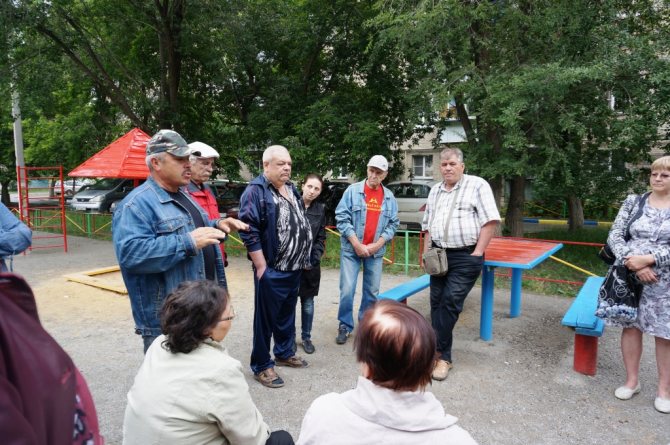Rights and obligations of homeowners in an apartment building
Property owners have certain rights regarding their apartments. In addition to the owner himself, other residents can live in it, temporarily or permanently.
They also have rights and responsibilities. Also, residents of an apartment building can dispose of common property. Each of these aspects requires separate attention.
Owner's powers
The basic rights relating to living space are formulated as follows:
- Ownership. This means that the citizen has living space and can retain it, as well as limit access to the premises by strangers.
- Right of use. The owner has the opportunity not only to live in the apartment, but also to make a profit from it.
- Right of disposal. The owner has the right to perform any actions with the property: sale, donation, exchange.

As the Housing Code states, the usable areas of apartment buildings must, first of all, be used for living. But, in addition to this, the owner of the apartment has the opportunity to use his property for work.
Residents can set up a studio there, produce goods, or simply work on a computer. The main criterion that limits such use of living space is that the activity should not affect the rights of any of the neighbors.
This means that noisy work should not be carried out, especially at night, and production should not involve toxic or strong-smelling substances.
In addition to individual use, the owner has every right to temporarily rent out free space. In this case, the tenant can be not only an individual, but also a legal entity.
The latter option requires the conclusion of a formal lease agreement, and the apartment can be used exclusively for living. For example, accommodation of company employees during business trips.
Noise from neighbors
Loudness is a controversial issue based on the subjective perception of sounds, therefore the following legislative acts have established standards for noise levels in the home:
- Law of March 30, 1999 N 52-FZ (as amended on July 3, 2016),
- Standards No. SN 2.2.4/2.1.8.562-96,
- SanPiN 2.1.2.1002-00.
Many constituent entities of the Russian Federation set their own restrictions on the levels and intensity of various sounds, because noise not only causes unpleasant sensations, it harms the health of others.
Attention! Our qualified lawyers will assist you free of charge and around the clock on any issues. Find out more here.
For example, the following legislative norms have been adopted in Moscow:
- Law of Moscow dated July 12, 2002 N 42,
- Law of Moscow dated January 29, 2003 No. 4,
- Moscow dated February 8, 2005 N 73-PP.
Moscow Law No. 45 dated November 21, 2007. Homeowners and tenants are required to maintain silence every day from 23.00 to 07.00 in accordance with the requirements of federal law. By violating these rules, residents violate their neighbors' right to rest.
Let’s assume a noise level that does not exceed 40 decibels during the day and 30 at night.
Please note! In the evening and at night, certain types of work that should be classified as noisy are strictly prohibited:
- work related to the use of construction tools,
- rearrangement of furniture,
- listening to loud music,
- singing and playing musical instruments,
- use of pyrotechnics,
- watching TV at high volume.
On weekends from 7.00 to 12.00 it is also prohibited to carry out noisy repair work, the noise level of which exceeds 55 decibels. In regions, the time periods during which the restriction applies may be slightly changed.
In most regions, noise is prohibited from 10 p.m., and in some areas silence must be maintained after 9 p.m. During established hours, it is prohibited to make noise not only in apartments, but also on staircases, in entrances and in the local area.
An HOA or management company has the right, at the initiative of residents, to supplement or change the time periods established by law and prohibit making noise during the day when small children are sleeping.
The permissible noise level in decibels may vary depending on the soundproofing capabilities of the walls. In houses of different constructions, the same noise can be either unnoticeable or really annoying.
If disputes arise between residents, then if they go to court, a decision is made aimed at protecting the residents’ right to rest, even if the noise does not exceed the norms established by law.
Watch the video. What to do if they smoke in the entrance?
What is prohibited

In addition to the ban on violating the rights of citizens living nearby, there are a number of actions that the owner is not allowed to carry out.
The apartment owner does not have the right to independently dismantle, even temporarily, parts of communications passing through his living space.
To carry out any such work, certain permission must be obtained, and some actions must be performed exclusively by professional employees of the relevant services.
For example, moving a gas stove, which requires making changes to the design of the gas pipeline. The owner of the apartment does not have the right to do this with his own hands, since the slightest violation of safety regulations can lead to serious negative consequences.
It is also impossible for the owner to independently change the layout of the living space. Before making any changes, the owner must obtain official permission for them. By carrying out illegal redevelopment, you can cause serious damage to the common property of a residential building, which can provoke the destruction of the building.
Residents who are not owners

In addition to the owner of the property, other persons who are not subject to the right of ownership of the property have the right to be in the territory of his apartment. In the vast majority of cases, these are members of his family, registered temporarily or permanently.
According to the Housing Code, family members include spouses, children, and parents. In some situations, other people may be considered family members.
The owner has the right to register them, permanently or temporarily, in his apartment, and then they automatically receive the status of family members from a legal point of view.
Residents, temporarily or permanently registered, have the same right to use the living space as the owner himself. But, if they intend to engage in work, rent out part of the space or redevelop the housing, they are required to obtain the consent of the owner, and only after that carry out any actions.
Along with rights, temporarily registered residents also receive responsibilities. Citizens, with the exception of incapacitated persons, bear the full burden of responsibility for the condition of the apartment and its use for its intended purpose.
They must pay for the provision of utilities in full at fixed rates. Payment of property tax is entirely the responsibility of the apartment owner.
Procedure for making payments for utilities
According to the current legislation of the Russian Federation, every person living in an apartment building, regardless of whether he is the owner of the living space or a tenant, is obliged to promptly pay for the utilities provided to him by the building management. This obligation usually operates on the basis of a signed agreement between the parties.
If the tenant of the apartment does not make payment on time and does not make it in full, representatives of the management company have the right to collect the debt from him in court and charge a penalty.
In addition, if this situation arises, representatives of the managing house authority have the right to suspend the supply of utility services to debtors or limit them. This is possible except for the supply of hot and cold water.
Services are suspended thirty days after the resident has been given written notice of the termination of supply. Time is given to the person to pay the missing amount or pay it in full in case of non-payment of the debt.
Incomplete payment is if a tenant has a debt for a particular utility service, and the amount of this debt is more than three monthly rents, which are calculated on the basis of general service consumption standards, regardless of whether the tenant has meters or not. The basis is taken on the amounts current on the day of restriction of the supply of utilities to the debtor if he refuses to repay his debt.
The company managing an apartment building can charge utility bills to residents of apartments that are not equipped with metering devices, but have not yet been put into operation.
In addition, payment can be charged in the general manner if residents do not provide information about the indicators of metering devices to the management organization.
If the owner of the living space and the tenant have violated certain rules of living together in an apartment building, he will begin to pay additional rent. The amount of such payment is the amount of the damaged property and is established by the management organization on an individual basis. These funds are used to restore property in case of damage or for technical needs.
Rights after the end of a family relationship
The clearest example of such a situation is divorce. When a citizen ceases to be a member of the home owner’s family, he cannot claim the right to use the apartment.
But there are exceptions to this rule.
- It is strictly prohibited to evict a minor child.
- The right to use a property can be restored through the court if, after the end of a family relationship, a person has no other housing option. In judicial practice, there are situations where the owner is obliged to provide a former family member with other living space.
- The Family Code determines that if the spouse of the owner of the apartment was registered in this residential premises, then even after a divorce he has every right to live there. If such a situation arises, it is necessary to go to court or sell the apartment. Then the former family member can be deregistered.
In order to avoid conflict situations related to the use of real estate, you need to draw up and sign an official document in advance. Depending on the degree of relationship, this is a marriage contract, a lifelong maintenance contract or an annuity contract.
In cases where housing in an apartment building is not registered as ownership, after privatization all registered residents become owners.
Question No. 10. Gas service workers force you to install a gas meter. Is this legal?
According to clause 5.2 of Art. 13 of the Federal Law “On energy saving and increasing energy efficiency and on introducing amendments to certain legislative acts of the Russian Federation” dated November 23, 2009 N 261-FZ, the obligation provided for in Part 5.1 of this article does not apply to owners of residential buildings and premises in an apartment building home heated without the use of gas-powered equipment.
In other words, if you use gas only for cooking, and for no other purposes, for example, for heating water or heating your home, then you do not need to install gas meters.
Rights of residents regarding the common property of an apartment building

In accordance with housing legislation, common property is in shared ownership of the owners of the living space.
This includes premises and objects that are not part of the apartments:
- interfloor stairs and landings;
- elevators and their shafts;
- corridors, if any;
- roofs;
- attic spaces;
- basements, which provide access to communications;
- the adjacent territory of an apartment building with all the objects and landscaping elements located on it.
All homeowners have equal rights to use, own and dispose of this property.
In addition to direct use, owners of real estate objects can carry out redevelopment or reconstruction of these objects. Often this is a combination of residential and attic spaces, extensions or expansion of the house, or an increase in the attic area.
Such work is carried out to equip various amenities, for example, the creation of verandas, winter gardens or gyms, or to rent out vacant space.
Ownership of the local area plays a very important role. This is not just a piece of land under and around the house, but also all the buildings and other elements located in this area.
Only the residents themselves have the right to decide what will be located on the common territory. Without their consent, the construction of garages, shops, playgrounds or parking lots cannot be carried out. Any work on the creation of any objects carried out without the knowledge of the residents is absolutely illegal.
All decisions related to common property must be agreed upon at a general meeting of residents. Some activities require permission from local governments.
To receive it, you must provide the minutes of the meeting of homeowners, which indicates the consent of the majority of residents to the reconstruction or construction of a new facility. In this situation, the votes of temporarily or permanently registered citizens who do not have ownership rights to the property are not taken into account.
Homeowners have the right to rent out non-residential premises located on the ground floor of the house, as well as part of the common area of the house. Financial resources received as a result of such a transaction can be used for landscaping, repairs, and paying the concierge.
Despite the fact that the adjacent territory is in the common ownership of all residents, it is impossible to allocate a specific part of it for the use of one or several citizens. It is also prohibited to place garages in the yard without authorization, organize planting or carry out other work.
Even if you are the owner, all actions must be coordinated with the other neighbors at a house-wide meeting.
What is common property
Often in the codes of rules for living in apartment buildings there is such a thing as common property. So, let's find out what it is:
- landings, stairs; elevator; elevator shafts, corridors, attics and other utility rooms;
- premises of the house that do not belong to any of the apartment owners, intended for social and domestic needs;
- roofs and supporting structures;
- land plots adjacent to the house.
Residents of the house are prohibited from performing the following actions in areas related to common property:
- use them as production workshops;
- store food and furniture in technical premises;
- change the volume of premises;
- clutter the stairs with things and equipment;
- clean premises using kerosene and other flammable substances;
- install blind bars in the basement;
- install additional doors if this will interfere with the free movement of other people in the entrance of the house;
- smoking in the corridor, elevator and on the stairs;
- do not damage walls or post notices in places that are not intended for this purpose;
- park on playgrounds and footpaths;
- repair and wash a car in the local area;
- store garbage in places that are not intended for this purpose;
- arbitrarily cut down trees and other green spaces planted on the property;
- install garages, fences and other buildings without appropriate permission.
If you want to install a satellite dish, wires, air conditioning on balconies and common property areas, you must obtain appropriate permission from the building management representatives.
Parking cars near the house is allowed only in a specially marked area.

Residents' responsibilities

Along with rights, owners have a number of responsibilities related to the operation of the house in general and their personal apartment in particular. This also applies to temporarily registered citizens living in this living space.
First of all, the homeowner is responsible for maintaining all common property in proper condition. This also applies to owners of communal apartments.
Each tenant, temporarily or permanently registered in an apartment, must respect the rights of neighbors and not ignore the rules for the use of common premises and the rules for maintaining common property.
For example, residents whose apartments are on the ground floor of a building still have to pay for elevator repairs and maintenance, even if they never use it. And homeowners on the upper floors are required to take part in eliminating basement flooding, although it may seem that this practically does not concern them.
All owners, without exception, are required to pay the costs associated with the maintenance, repair and improvement of common property. These include payment for the services of the management company, various payments and contributions required for members of the HOA.
Owners of living space who are not members of such organizations pay a fee for repairs and maintenance in accordance with the Housing Code. The amount of contributions is calculated based on the area of the property owned by the citizen.
Also, every owner and registered citizen must pay utility bills on time. If a certain amount of debt arises, the supply of water, gas or electricity to the apartment may be suspended. It can be renewed only after the debt is paid in full.








